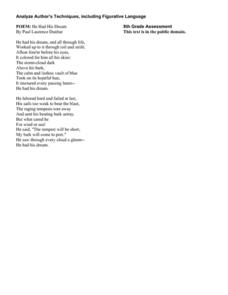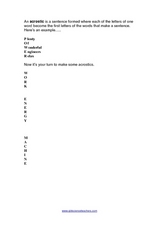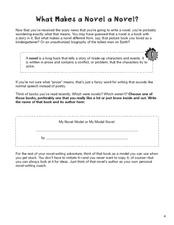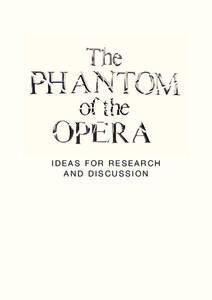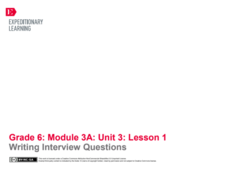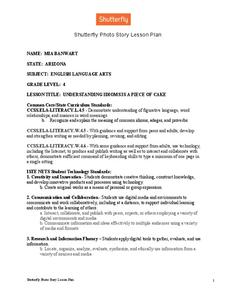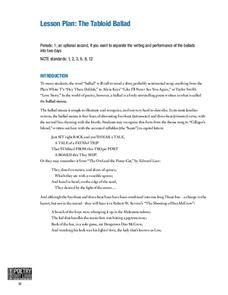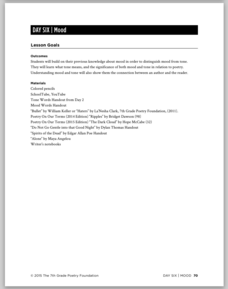Curated OER
Guided Reading: Three Little Pigs (Plus Wolf: Javalinas)
Guide your class through reading various versions of The Three Little Pigs. Talk about the traditional story line and then discuss a different point of view: Maybe the wolf was just an innocent bystander! This lesson plan, which has...
Curated OER
Haiku Movies
Pupils create a movie to illustrate an original haiku poem in this upper-elementary school, Language Arts lesson utilizing technology. The lesson meets state standards for Language Arts and includes a materials list and possible lesson...
Curated OER
Analyze Author’s Techniques, Including Figurative Language
Paul Laurence Dunbar's poem "He Had His Dream" is the focus of a quick exercise. Pupils read the poem and answer four multiple choice questions and one short answer question about specific lines in the poem and the author's purpose....
Curated OER
Pirate Poems
Students increase their awareness of the fundamental of poetry. They write their own poetry on a familiar topic. Students create a paper-bag puppet on which to display their poem. They are told that poetry is a special way to tell a story.
Curated OER
Making Acrostics
In this making acrostics activity, 8th graders read the definition of an acrostic, read an example of one and write 3 acrostics using the words work, energy and machine.
Curated OER
Homeric Questions
Review all things Homeric with this quiz! It covers the plot of The Odyssey, along with technical questions about poetic meter and stressed syllables. The Greek language is on display with Homer's writings and with this quiz.
Curated OER
The Life and Lines of Robinson Jeffers
Robinson Jeffers had various twists and turns in his life that make for a great quiz! Fairly long questions are complex and detailed. Contains a lot of biographical information and a little bit of information about his poems.
Curated OER
Personification #2
Langston Hughes’ poem, Fall Leaves, provides the text for a personification identification worksheet. Pupils underline examples of this literary device and then write an explanation of how it is used in the poem.
Curated OER
Capitalization and Punctuation
First and second graders explore writing conventions. They add question marks or periods to the end of teacher generated sentences on sentence strips. They locate punctuation marks in poems and write original sentences using appropriate...
Curated OER
Descriptive Writing
Have your class practice using descriptive language in their writing. This resource provides learners with a list of terms and adjectives. For example, one slide shows a picture of a wolf, and then lists descriptions, such as moon howler...
Curated OER
Lesson Plan 3: Great Book, Gross Book
It's time for your scholars to become book reviewers! Start with a fun review of foods: are they good or gross? Learners apply these evaluation techniques to books, recording their thoughts on large pieces of butcher paper. Simply have...
Novelinks
The Hobbit: Biopoem
As part of their reading of The Hobbit, readers create a biopoem for one of Tolkien's characters.
Curated OER
Picture This
Elementary writers practice writing descriptive paragraphs by adding adjectives and sensory words to their writing. They use a picture of a monster for their descriptive paragraph. This 12-page lesson should increase your charges...
Curated OER
Do You Want to Be My Friend?
Learners participate in a variety of emergent and early-literacy activities based on a "friendship" theme. Learners listen to the book Do You Want to Be My Friend by Eric Carle, then echo read, choral read, and independently read...
Curated OER
What Makes a Novel a Novel?
As your authors prepare to write a hypothetical novel, they need all the inspiration they can find! Using a book they have already read (and enjoyed), learners complete a literary analysis by filling in eight short-answer questions....
Phantom of Opera
The Phantom of the Opera: Ideas for Research and Discussion
You could spend a full day discussing The Phantom of the Opera and not scratch the surface, but a set of lessons about the literary elements and themes of the musical production is a great start. Young thespians build upon the background...
Curated OER
Need a House? Call Ms. Mouse!
First graders are read many books and they are to make a poem, write a story, or perform some other activity showing their understanding of how environments function.
Curated OER
The Language of Surprise
Aspiring writers complete and discuss fill-in-the-blank cliché expressions, define cliché as a form of predictable writing, take cliché expressions and turn them into new, unpredictable ones, read poetry that illustrates writer's use of...
EngageNY
Writing Interview Questions
And now for the star witness! Scholars take a look at a model newspaper article and discuss the importance of eyewitness accounts. In groups of three, they take turns underlining text from eyewitnesses. They then regroup to talk about...
Shutterfly
Photo Story Lesson Plan
After reading Loree Leedy's There's a Frog in My Throat: 440 Animal Sayings a Little Bird Told Me, kids create and illustrate their own poems that convey the meaning of an idiom. The poems are then transferred into Shutterfly's Photo...
Curated OER
Performance-Based Assessment Practice Test (Grade 4 ELA/Literacy)
Track the progress of your fourth graders' reading and writing skills with this practice Common Core assessment. Based on a collection of six reading passages that include narrative stories, poetry, and a series of informational...
Poetry Out Loud
The Tabloid Ballad
What do the theme song from Gilligan's Island, the nursery rhyme "The Owl and the Pussy-Cat," and the poem "The Shooting of Dan McGrew" all have in common? Why, they're ballads of course! Challenge your young balladeers to compose their...
EngageNY
Grade 11 ELA Module 2: Unit 2, Lesson 11
In Audre Lorde's poem "From the House of Yemanjá," the speaker describes her mother's two faces, adding a whole new meaning to the phrase "two-faced." Pupils first read the final stanza of the contemporary poem. With a Quick Write, they...
Curated OER
Mood
Young scholars learn how to distinguish between the mood of a piece of writing (how the work makes the reader feel) and the tone (the writer's attitude toward the material) in the sixth lesson in a poetry unit. After watching two very...
Other popular searches
- Writing Poetry Onomatopoeia
- Writing Poetry Third Grade
- Writing Poetry and Prose
- Creative Writing Poetry
- Writing Poetry Rhyming Poems
- Descriptive Writing/poetry
- Writing Poetry Unit
- Writing Poetry Lesson Plans
- Poetry Writing Workshop
- Writing Concrete Poetry
- Writing Poetry On
- Teaching Poetry Writing




